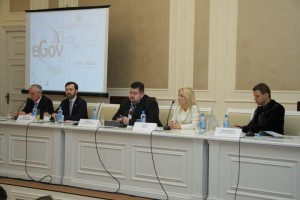Today TechCrunch has posted a video interview with AlenaPopova by MikeButcher on TechCrunch Moscow:
Alena Popova, is a former TV journalist who got into Web 2.0 a while back and is now a specialist in “Government 2.0″. She is also a venture investor in a social shopping startup in Russia and startup adviser.
We chatted about the startup scene and Russia’s Skolovo project to create a Silicon Valley in Russia. She’s also working on generating greater awareness of e-government in Russia and helped establish the project Duma 2.0 in Moscow. At the recent TechCrunch Moscow event I talked to her about empowering ordinary citizens in Russia through Government 2.0 platforms – especially important in a developing economy like Russia’s where officialdom can often disappoint – and the startup scene in Russia.
via TechCrunch.com
We are glad to announce you our new project — StartupAfisha
StartupAfisha – online key-project, performing a function of a single entry point for all entrepreneurs, investors, and the organizers of a start-up activities in Russia. It is a guide to all communities and leaders of innovation. Weekly newsletter of StartupAfisha provides an opportunity to receive comprehensive information about all the start-up events in every region of Russia.
December 08 – December 14, 2010
01. Governors are proposed not to spend money on software for schools
The Armada Company has sent a letter to the Russian governors, which proposed to use “Alt Linux” in schools, concluding gratuitous permanent agreement.
02. 30% of educational institutions are connected to the electronic register In the Kemerovo region.
Electronic register – a program containing all the information about lessons, assessments and homework assignments. It is accessible over the internet to all participants of the educational process — teachers, pupils and their parents.
03. Children of Pskov region can be registered over the Internet
Filling in of just one request is enough to receive a childs’ birth certificate and some other documents for the kids — medical insurance policies and insurance. They can also be put into the queue for a place in kindergarten.
04. Russian strategists on information of education have received their awards.
Crystal figurine in the form of the flame got nine winners in 7 categories. 200 professionals at all levels of education, were presented through an online nomination site http://cio.pedsovet.org
05. Ministry of Justice had begun an experiment on the jural debates on the Internet.
Now the lawyers will appear at several sites for the sharp legal debate. The outcome of their discussion on portals will become a report to the Ministry of Justice. The document represents the agency monthly summary data of e-voting of member of legal resources and their views on the need for changes to the existing legal regulation.
06. Rostelecom has opened Russia’s first “infomat”, allowing residents to receive all available government services in electronic form.
Multifunctional informational terminal – “Infomat” allows any citizen of Russia, not having their own access to the Internet, to receive all available government services in electronic form on federal, regional and municipal level through a single portal http://gosuslugi.ru.
Alexandra Markova is our bright IT-future in the Valley speaks to the Saad Khan the head of one well-known fund in the Vallay — CMEA Capital. They are speaking about what projects should be invested in, what are criterias for project success and what is digital media as an area for investment. CMEA is 1.2 billion fund.
By the way, about a great project, which I studied later: conversion of images from the mass-media into a commercially interactive: do you like the shoes in the picture then click and buy.
Watch a lot of useful information from the CMEA Capital expert and the beautiful Sasha Markova in the interview next:
Moscow citizens would receive the special electronic cards starting the year 2011. This card will become a substitution for health insurance policies, pension insurance certificate, tickets and will be an ID for different public services. This was stated by the mayor of Moscow, Sergei Sobyanin at the meeting of the Moscow City Duma on Wednesday during the discussion of the draft budget of Moscow in 2011.
This new universal card would keep all the opportunities of todays «Moscow citizen’ social card» — said the mayor .
Transition to a universal electronic card will be carried out smoothly in a single year. «City program «Electronic Moscow» will be updated in the near future, — said Sobyanin. The program priorities would be set to: provision of more than 60 most popular government services, providing of online interaction between the services involved in the calculation of social benefits, the creation of a unified geographic information system, as well as the maximum involvement of citizens in city management.
It was recently reported that Russian citizens can replace paper passports for internal identification cards and the government is also discussing the project of the consolidation of electronic passports with bank cards under the National Payment System.
Prime Minister Vladimir Putin believes that Russia needs a universal card that would provide access to all public electronic services, and would be taken by all departments.
«Sberbank», «Bank of Moscow», «Uralsib» and «Ak Bars» created JSC «Universal electronic card«, which would create a single information and billing system for providing information and banking services.
Andy Maimoni: We want to be valuable every day, 24 hours a day, 7 days a week.
Read our interview with Andy Maimoni the Deputy Director of sf311.org and find out how does e-government operates on the level of the biggest American city.
I learned about general information service 311 at the conference Tim O’Reillys’ Gov2Expo. They told me that this is the most effective e-government practices of their type.
So, as always, when I was in San Francisco, I came to see this project. Because I do not trust the words: I love to see it all by myself. Experience is the best weapon.
The «311» idea implementation is fair simple if you understand the essence of the system. Similar projects exist in Russia, but «sf311» is the only example on all conferences.
You dial just one number (311, for you it’s free) and you get all the information on issues related to the authorities.
Most frequent requests — graffiti, trash, licenses. In Russia it will be housing, transportation, passport, citizenship. For such a megalopolis as Moscow the idea of 311 is more than useful and can be implemented with all its pros and cons.
I asked them to show how the system is arranged, had conversation with the staff, watched over their work. All the working process can be real-time monitored over a huge number of monitors that are placed around the office. There is also a differentiation of the common questions and issues relevant to police activities. These people even work in a separate office block.
Why does this simple scheme works? Clear objectives, clear means and … yes, of course, the proximity of Silicon Valley. I asked the question: how do people understand whom do they need to forward the phone-call, how long has it taken to create such a database? continue reading
We continue the development of our new project with the all important news in e-government field of Russian federation.
December 01 — December 07, 2010
01. The Internet has begun to discuss a new law on education.
The beginning of the discussion has been announced on the twitter blog of Russian President Dmitry Medvedev.
02. For the second year the MTS is becoming the winner of the competition for the data providing services conducted by the State Duma. Read more
03. The electronic items of book returns – “Bibliolocks” may appear in Moscow soon
Moscow is developing the project of library-network modernization.
04. Ministry of Economic Development and Trade in joint with Federal Treasury are launching the new “procurement block” which will lead to all government procurements to become accumulated on the one web-site. Source
05. The IM-service for government employees is launched in the south-east part of Moscow.
The program is closed-sourced and access is restricted to staff of the prefecture, the control regions and municipalities. Source
06. Kazakhstan: By 2012 more than 100 electronic government services will be available on the State and municipal services portal. Source
07. Kaliningrad authorities are creating an “electronic government”.
More than 60 public services are going to be converted into electronic form. Source
08. Municipal government would report over the Internet about prospective territories for building and development. Read more.
You can find all the news based on the e-government development in Russian Federation in our eGov digest section.
Anastasia Prisyazhnaya — a young, active and purposeful lady. She organizes IT-meetings based on the Silicon Valley philosophy. She carefully selects every speaker, then “torments” them on the subject of speech to be no more than 5 minutes. Before my speech Nastia called me 5 times with the words that I have to attend the training session to practice my 5-minute-speech, or people will fall asleep. I promised her that I’ll make everything up. Everything succeeded and Nastia was very pleased.
Nastia went to the U.S. And then returned back to Russia with a great desire of creating the working projects there.
Anastasia Prisyazhnaya & Esther Dyson about MeetUp in Moscow:
On November 26 we had the first e-government conference taken in Moscow. This is the first event which is case-study based, the best practices were demonstrated there.
The total number of participants: 273 persons, 80% are authorities’ officials and 20% are experts.
There were 52 reports made on the next subjects:
- Providing of electronic public services in education and healthcare.
- Providing of electronic public services in the social welfare areas, transport, housing, safety and construction.
- Authorities 2.0. Social media usage by public officials.
- Social initiatives, crowdsourcing and non-government projects.
The conference was attended by representatives of the authorities from Moscow, St. Petersburg, Tolyatti, Kostroma, Samara, Pskov, Tver, Yaroslavl, Pskov, Kursk, Astrakhan, Sverdlovsk, Krasnoyarsk, Novosibirsk Region, the Republic of Bashkortostan, Perm, Krasnoyarsk territories, the Republic of Tatarstan, Chuvash Republic, the Republic of Komi, Republic of Udmurtia, Republic of Khakassia. You can see the full list here continue reading
As we stated on our project page, today we’are starting our new blog project e-government digest.
November 16 till November 30 2010
01. On March 01 the universal citizen card will be introduced in all subjects of the Russian Federation.
It will replace the regular paper medical insurance policies – Source
02. State and municipal services portal (this is the e-government project which provides all the federal services via web — http://gosuslugi.ru) extends it functionality.
Now citizens can simplify the number of traffic police procedures. They can apply for a drivers license registration, register for a technical inspection or pass the registration of a vehicle.
03. A pilot project “Safe City” is launched in the Stavropol region – Source
04. Republic of Tatarstan: Admissions to kindergartens will be implemented via the web — Source
05. Vladimir Putin has now approved the “Information society” program – Source
06. Municipal departments have to make an electronic signature key on the Government of Russian Federation website – Source
07. The GLONASS based monitoring system will reduce the traffic jams level up to 30% — Source
08. Tyumen: The patient hospital records will become online — Source
09. The government has presented report on its major IT-projects — Source
10. MTS and Moscow Metro began to test the subway fare via cellphone — Source
11. Yandex can now process bar codes — Source
12. Russian traffic police is now ready for an on-line feedback — Source
13. On November 26 the first Russian eGov 2.0 conference has been held. You can read about results here







